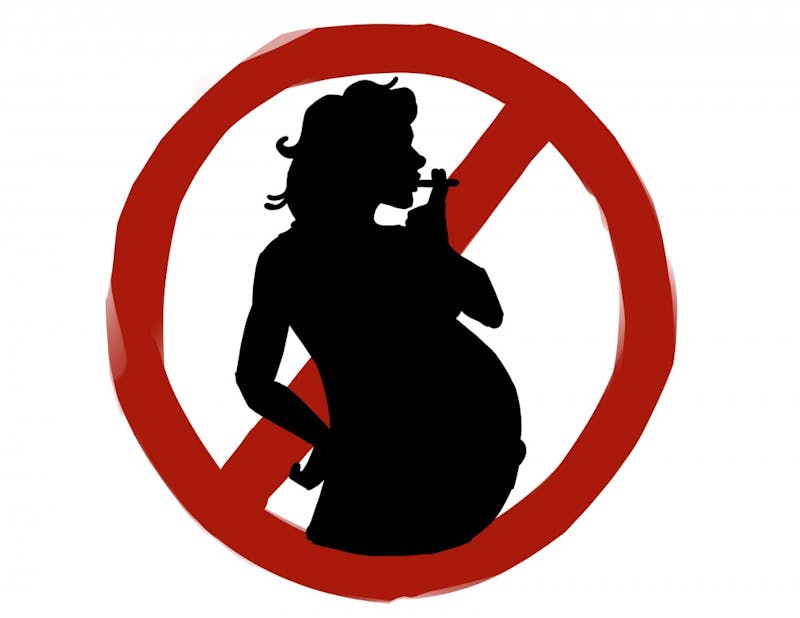
The Wisconsin Women's Health Foundation is working to help pregnant women and new moms quit smoking.
Image By: Max Homstad
The Wisconsin Women's Health Foundation is working to help pregnant women and new moms quit smoking.
Image By: Max HomstadNew and expecting moms consider everything when it comes to their child’s health.
Chemicals pregnant people ingest can have lasting impacts on the baby’s life, from creating an addiction before the child is even born to mental and physical damage.
One Madison-based group, including the Wisconsin Women’s Health Foundation, is trying to stem the tide of smoking-related health consequences for pregnant people, new moms and their children. WWHF was founded in 1997 by Sue Ann Thompson, wife of then-Governor Tommy Thompson. Since 2001, it has offered a free program to help new and expecting mothers, as well as people around them to quit smoking.
The program, dubbed “First Breath,” has helped more than 20,000 women statewide since it began and, according to its website, boasts an 84 percent success rate in participants quitting or cutting back on smoking.
But for Kristine Alaniz, WWHF’s maternal and child health programs manager, the number is not high enough, as there are many women in the state who are more susceptible to smoking due to environmental factors or other reasons out of their control.
“We have significantly higher maternal smoking rates than the national average and there are lots of different groups in our state that have even higher rates,” Alaniz said.
She added that women with lower incomes or educational attainment and women in rural areas of the state are more likely to be smokers.
In 2016, the Center for Disease Control and Prevention reported that 11.3 percent of pregnant women in Wisconsin smoked while pregnant, which is well above the national average of 7.2 percent. The CDC also found that Wisconsin women who did not finish high school or who did not have any education beyond a high school diploma or GED were around 12 times more likely to smoke while pregnant than those who have a bachelor’s degree.
Though more than 75 percent of the women who participated in First Breath in 2017 did not have a college degree and more than 80 percent were on Medicaid, Alaniz said WWHF works to help women of all different groups quit.
“Nicotine is highly addictive and a lot of our participants have significant life stressors,” she said. “Over the past two decades, we’ve changed our approach to reach those needs.”
WWHF has conducted two research studies to determine how they can better serve low-income women specifically, Alaniz said. She also identified other substance use, mental health and the social pressure of living with other smokers as major barriers.
Though traditional tobacco use may be on the decline, Alaniz said she sees a new threat, particularly among young people: e-cigarettes and vapes. The Wisconsin Department of Health Services found 20 percent of high schoolers in the state currently use e-cigarettes, a rate four times higher than for conventional cigarettes. More than one-third of high schoolers reported having ever used an e-cigarette.
While WWHF does not directly go after the e-cigarette problem at the source, Alaniz said they are allied with those who do.
“We work with a lot of the tobacco coalitions throughout the state who are really pushing for taxation of those products and also to make sure you have to be 18 to purchase them,” she said. “The youth right now are the pregnant women in about 10 years so that’s something that we really support.”
Though vapes do not contain the cancer-causing materials cigarettes do, they still pose major health threats to the user as well to a developing fetus whose mother is using them.
“E-cigarettes, vaping, Juuling, all of these things contain nicotine which is very harmful for a developing fetus,” Alaniz said. “We just try to play it safe throughout our program and encourage women not to use those products.”
She specified the danger lies in the unknown effects of many chemicals present in vapes, especially on babies still in the womb.
For now, the First Breath program is focused on curbing conventional cigarette use, the effects of which are well known and proven. In addition to the problems it can pose to children inside the womb, exposure to second and thirdhand smoke can have lasting health effects on children like breathing and sleep issues, learning and attention issues, an increased chance of sudden infant death syndrome and a higher likelihood of children one-day becoming smokers themselves.
The program is free for new and expecting mothers, mostly due to funds from the Department of Health Services, but also in part from various research grants, including one from UW-Madison.
Although Alaniz is working to eliminate maternal smoking in Wisconsin, she hopes people will not look down on those who struggle with nicotine addiction.
“When it comes to tobacco use among pregnant women, there tends to be a lot of judgment,” Alaniz said. “I would just challenge people to think about nicotine addiction in a different way. It’s one of the most powerful addictions that is out there and there is a lot of social and psychological addiction that goes with it.”